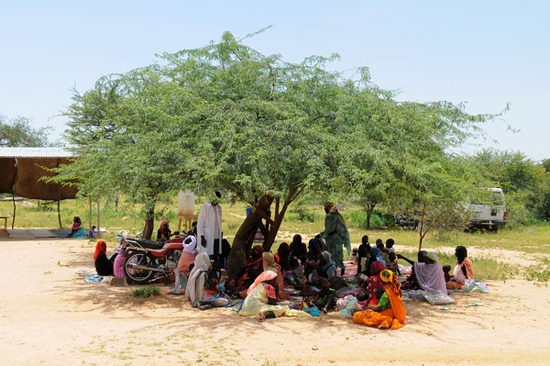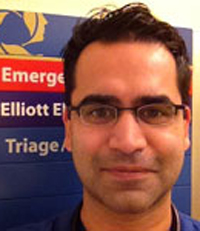MSF Doctor Raghu Venugopal describes his experience providing care in Chad's countryside.

Chad 2012 © Florian Lems
In the shade of a tree, women and children await care at a feeding center run by an MSF mobile unit in Chad. MSF teams make weekly visits to remote communities in Chad to provide much-needed health care to these populations.
Raghu Venugopal is a Canadian doctor serving as Medical Team Leader for Doctors Without Borders/Médecins Sans Frontières (MSF) in Amtiman, southeastern Chad. Read his MSF Field Blog here.
Thank you to everyone who has written supportive comments online. Your caring is solidarity with our service here. I have created pseudonyms for all the patient names below, to protect confidentiality.
I’m settled into the project now in Amtiman in southeastern Chad. The team is composed mostly of our local Chadian colleagues, many who originate here in the community and some who come from the capital city, N'Djamena. The expatriate team is a mix of Kenyan, German, Swiss, Haitian, Canadian, Swedish, Congolese, and Italian members. The logistical and coordination side of the local team equals or is even more numerous than the medical team. It takes a big non-medical team to support, and make possible, the medical program.
Our project here serves a population who have few choices regarding where and when they can seek medical care. Thus, we support a large district hospital where primary health care centers can refer the sickest patients. In the Amtiman hospital we care for malnourished children, the pediatrics program, the HIV/TB service and the care of women in pregnancy. These patients reflect some of the most medically vulnerable patients in the region. Our actions support the Chadian Ministry of Health in its effort to care for its population.
Another of our key priorities is medical outreach in smaller local communities. Each day, two outreach teams drive out into the countryside to support nine locations. There, we conduct antenatal and prenatal care and family planning. We also conduct malnutrition screening and ambulatory treatment. Any patient too sick to be managed on an outpatient basis is transferred to the hospital. The team also encounters patients who have other serious medical problems, and those patients are consulted and treated, and, if necessary, are transferred.
I love outreach.
In outreach, we are able to leave the confines of the office, house compound, and hospital and get out into the countryside. I am reminded the majority of people are healthy and eking out a living, caring for their families and living their lives in their communities.
I got up at 5:30 a.m. to prepare for the day in Kash Kasha. In addition to all of our essential medical equipment, the most important two personal things I took were a wide-brimmed hat and two large bottles of water. Both proved essential in the mid-day heat, that is like a hair blow-dryer in one’s face.
As a doctor with the team of nurses and midwives, I was able to observe and ask questions about the medical activities. Andrea, our Swiss nurse on her second mission in Chad, explained to me the way the team organized its work and, together with our staff, we assisted with consultations and problem-solving.
Jonas was brought to my attention by the community outreach workers. He was 30 days old and his mother said he was not breastfeeding and was convulsing. The mother unwrapped her precious little bundle and I examined him on the ground, on a mat, under a wind-swept tree. Jonas’ neck was stiff and one could gently raise the child off the ground just by holding his head. The differential diagnosis was either meningitis or tetanus. We gave Jonas antibiotics and transferred him to the hospital. He’s currently still here and doing well.
Ismail was another little boy I was asked to see with Andrea. He was on the verge of death. He was severely malnourished and severely dehydrated. We followed our protocols and started rehydrating him by mouth. He eagerly drank under the tree and we taught his mother how to give oral rehydration fluid to him with a syringe. He made a good improvement, but was seriously ill. When we got to the hospital our German doctor Anja was waiting. I phoned her ahead while we were on the road. Her team whisked him to the intensive care ward and carefully took care of him. But sadly, despite our efforts, he died last night. I’m very sad. I know we tried our best.
The midwives on the team called me over to see another child, Marie. She was just six days old, and was not breastfeeding. The child’s new, pink skin was protected under a shawl. I stroked the baby’s head but she did not respond or move. Her eyes were infected and she was severely dehydrated. We quickly inserted a nasogastric tube and began rehydrating her. The mother was very young, so we brought her and the grandmother back together in the Landcruiser to the hospital. Marie is now doing well I was happy to learn last night.
Mahmood was also shown to us by the nurses. We all got on our knees around his mother to examine him. He was lively and well-appearing but had a large, soft swelling on the side of his neck. I examined him as the mid-day sun got extremely hot and the tree afforded no shade. My top differential diagnosis was extrapulmonary tuberculosis—TB of the lymph nodes. We brought Mahmood to the hospital and he is now under the care of Guy, our Congolese doctor, who is evaluating Mahmood. Young children are the most vulnerable to TB, and the disease is curable.
As I had hoped, my day with the outreach team was invigorating. It gave me a break from the hot corner of the office where I sit and deal with emails, reports, and the daily troubleshooting necessary to run an MSF project.
The clinic under the tree was a great experience. Our patients were children with serious yet treatable medical conditions. We were able to bring essential health care to a population with few options. The MSF team was busy, working smoothly, and had the trust of the community after coming to this tree for the past three years. In that time, we also built some shelters, so that children and women awaiting reproductive health or nutrition services don’t bake under the hot sun.
I’ll be sure to let you know next time I can do the clinic here—or under any other tree.
Farewell for now from the house-call . . . to Chad.





